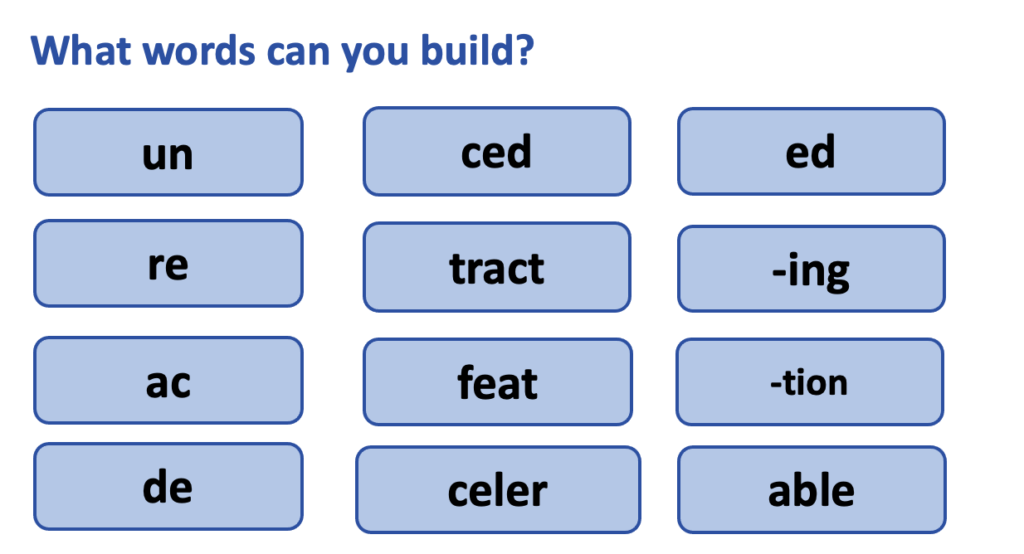How do you educate a difficult new phrase, or search to spice up the phrase hoard of the pupils you educate?
One of the crucial widespread approaches to growing educational vocabulary is to check morphology – breaking phrases down into their element components and roots. It could assist the event of educational vocabulary in topics like science which can be laden with technical vocabulary, in addition to constructing a wealthy networks of recent phrase households to be used throughout the college curriculum.
It’s an method as historic because the Greek and Latin societies that generated so lots of the phrases that dress our modern-day faculty curriculum. New analysis retains including to the image that that is an method lecturers ought to contemplate as a part of important classroom follow.
A small current US examine on, ‘What’s in a phrase? Results of morphologically wealthy vocabulary instruction on writing outcomes amongst elementary college students’ (2022), revealed that younger youngsters who had been taught with a morpheme focus to thier instruction made positive aspects with spelling and understanding phrase meanings, although it was much less efficient when judging essay writing (a a lot larger problem, the place phrase data and decisions could also be compromised).
The second current examine on morphology educating, entitled ‘Progress in written educational phrase use in response to morphology-focused supplemental instruction’ (2022), confirmed that for older major faculty age US pupils, they developed a rise in educational phrase use throughout two phrases when given morphology instruction in comparison with enterprise as ordinary. Curiously, pupils who struggled with literacy didn’t make as many positive aspects – which ought to give us pause.
How typically do the phrase wealthy get richer, irrespective of our makes an attempt? It doesn’t rule out educating vocabulary utilizing morphology, however we should always recognise that some pupils will nonetheless battle to develop educational vocabulary and so they want our further helps to entry the curriculum. Breaking phrases into their element components can simplify the advanced act of attending to grips with educational language, however trialling and testing it within the crucible of the classroom will matter.
What sensible approaches can mobilise morphology educating? Listed below are 4 Mighty Morpheme methods:
- Root Races (or ‘Spelling sprints’). Pupils take pleasure in being uncovered to new phrase roots and making a race for producing as many phrases from that root as attainable. Take the basis ‘Magni’, which means ‘nice’. We give pupils a minute or two to generate as many phrases as attainable (individually or in teams). Assume ‘magnificent’, ‘magnanimous’, ‘magnitude’ and ‘Magna Carta’. Then, after some counting of phrases, we are able to discover their connections and meanings and create wealthy educational phrase households.
- Phrase timber. A preferred method to exploring phrase households is to generate phrase timber. Web sites like Membean.com do a fantastic job of producing these, however it may be equally pretty much as good to generate them on a classroom show, or collectively as a category on the whiteboard (this may be deliberate, or spontaneous, if the pupils detect some significant morphology.
Membean.com
- Making morphemes seen. A full of life approach to generate concepts is to carry again on the phrase root, however to as a substitute to share three photographs which can be all signify phrases related by their widespread roots. As an example, what do they comply with three photographs signify?
‘Mal’ – which means ‘unhealthy or evil’ – so, ‘malevolent’, ‘Malaria’ and ‘malfunction’
- Phrase constructing. For the very youngest of youngsters, all the best way as much as A degree, we are able to develop vocabulary through phrase constructing. It has many variants, however the kernel of the method it to pick out prefixes (e.g. ‘un’, ‘re’ or ‘exo’) together with phrase roots (e.g. ‘tract’, ‘feat’ and so on.) and suffixes (‘ed’, ‘ing’ and so on.) and inspiring phrase constructing. You’ll be able to even have enjoyable making up some nonsense phrases!

